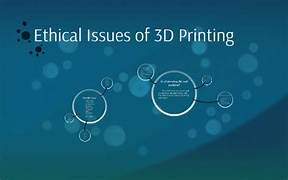What Are the Ethical Implications of 3D Printing Technology in Manufacturing?
3D printing, also known as additive manufacturing, has revolutionized manufacturing by enabling the production of complex, customized, and cost-effective objects across various industries. While this technology offers significant benefits, it also raises profound ethical questions that warrant careful consideration. From intellectual property concerns to environmental impacts, 3D printing challenges existing norms and regulations, requiring society to adapt to its rapidly evolving capabilities.
Intellectual Property and Copyright Issues
One of the most pressing ethical concerns associated with 3D printing is intellectual property (IP) infringement. The ability to easily replicate physical objects using 3D printers has blurred the lines between ownership and theft. Digital blueprints for products can be shared, downloaded, and printed without authorization, undermining the rights of original creators and companies.
For instance, if a patented product’s design file is leaked or reverse-engineered, it can be distributed online, allowing unauthorized individuals to reproduce the product. This situation not only results in financial losses for the rightful owners but also discourages innovation by eroding the incentives for creating proprietary designs.
To address this issue, governments and organizations must develop robust frameworks for digital rights management and IP protection in the context of 3D printing. Additionally, individuals and companies need to strike a balance between promoting accessibility to designs and protecting creative ownership.
Safety and Liability Concerns
The decentralized nature of 3D printing raises critical questions about product safety and liability. Unlike traditional manufacturing, where products undergo rigorous testing and quality control, 3D-printed items can be produced by anyone with access to a printer and materials. This democratization of manufacturing introduces risks, as unregulated production can result in defective or dangerous products.
For example, 3D-printed medical devices or spare parts for vehicles may not meet the necessary safety standards, potentially leading to injuries or accidents. Determining liability in such cases is a complex ethical challenge: Should the blame lie with the designer of the blueprint, the manufacturer of the printer, or the individual who printed the item?
To mitigate these risks, establishing clear safety standards and guidelines for 3D-printed products is essential. Manufacturers and users alike must be educated about the potential dangers of unregulated production.
Environmental Impact
While 3D printing is often touted as a sustainable alternative to traditional manufacturing, its environmental implications are not entirely positive. On the one hand, additive manufacturing minimizes material waste by using only the exact amount of material needed to create an object. However, the production and disposal of 3D printing materials, such as plastics and resins, can have significant environmental consequences.
Many 3D printers rely on non-biodegradable materials that contribute to plastic pollution. Additionally, the energy consumption of 3D printers, particularly industrial-scale models, can be substantial, raising concerns about their carbon footprint. As the technology becomes more widespread, these environmental challenges are likely to intensify.
Ethical manufacturing practices must prioritize the development and use of sustainable materials for 3D printing. Furthermore, recycling programs and energy-efficient technologies should be encouraged to mitigate the environmental impact of this transformative technology.
Economic Disruption and Job Displacement
The rise of 3D printing has the potential to disrupt traditional manufacturing industries, leading to job displacement and economic challenges. By enabling localized production and reducing the need for large-scale factories, 3D printing could render some manufacturing jobs obsolete. For example, assembly line workers and machine operators may find their roles replaced by automated 3D printing systems.
This economic disruption raises ethical questions about how society should support workers affected by technological advancements. While 3D printing creates new opportunities in areas such as design, material science, and printer maintenance, these roles often require specialized skills, leaving low-skilled workers at a disadvantage.
To address these challenges, governments and businesses must invest in retraining programs and education initiatives that prepare workers for the evolving job market. Ensuring an equitable transition to a 3D-printing-driven economy is essential to minimizing social and economic inequalities.
Weaponization and Misuse
The accessibility of 3D printing technology has also raised concerns about its potential misuse, particularly in the production of weapons. The ability to print firearms and other dangerous items poses significant ethical and security risks. In 2013, the first fully 3D-printed gun, the “Liberator,” demonstrated how easily individuals could circumvent gun control regulations by manufacturing weapons at home.
This capability undermines public safety and challenges existing laws designed to regulate the production and distribution of firearms. It also raises questions about how governments can enforce regulations on a technology that empowers individuals to produce such items anonymously.
Striking a balance between the benefits of 3D printing and its potential for misuse requires proactive regulation and international cooperation. Lawmakers must address the legal and ethical implications of 3D-printed weapons while preserving the legitimate uses of the technology.
Ethical Considerations in Healthcare
3D printing has revolutionized healthcare by enabling the production of customized prosthetics, implants, and even human tissues. While these advancements offer significant benefits, they also raise ethical concerns related to accessibility, equity, and consent.
For example, the high cost of advanced 3D printing technologies may limit their accessibility to wealthier individuals or countries, exacerbating existing healthcare disparities. Additionally, the use of bioprinting to create human tissues and organs raises questions about consent and the potential for exploitation. For instance, who owns the rights to bioprinted tissues, and how can ethical standards be maintained in such a rapidly advancing field?
Addressing these issues requires a commitment to equitable access to 3D printing technologies in healthcare and the establishment of ethical guidelines for bioprinting practices. Ensuring that these innovations benefit all of humanity, rather than a select few, is a critical ethical imperative.
Privacy and Surveillance Concerns
The integration of 3D printing with other emerging technologies, such as the Internet of Things (IoT) and artificial intelligence (AI), raises concerns about privacy and surveillance. For example, IoT-connected 3D printers could potentially track user activity, collecting data about what individuals are printing and sharing.
This capability creates opportunities for misuse, such as unauthorized surveillance or data breaches. The ethical implications of such scenarios highlight the need for robust data protection measures and transparent policies regarding the use of connected 3D printing devices.
Promoting Ethical Use of 3D Printing
To fully harness the benefits of 3D printing while mitigating its ethical challenges, stakeholders must adopt a proactive and collaborative approach. Key strategies include:
- Establishing Clear Regulations: Governments must develop comprehensive policies that address IP protection, safety standards, and the ethical use of 3D printing technology.
- Investing in Education and Training: Educational institutions and businesses should prioritize training programs that equip individuals with the skills needed to thrive in a 3D-printing-driven economy.
- Encouraging Sustainable Practices: Researchers and manufacturers should focus on developing eco-friendly materials and energy-efficient technologies to reduce the environmental impact of 3D printing.
- Fostering International Cooperation: Addressing global challenges, such as 3D-printed weapons and healthcare disparities, requires coordinated efforts between countries and organizations.
- Engaging in Ethical Dialogue: Stakeholders from various fields—including technology, law, and philosophy—should collaborate to address the ethical implications of 3D printing and develop solutions that reflect societal values.
Conclusion
3D printing technology has the potential to revolutionize manufacturing and improve lives, but it also poses significant ethical challenges that must be addressed. From intellectual property issues and environmental concerns to questions about equity and security, the implications of 3D printing extend far beyond the manufacturing process. By promoting responsible use and fostering collaboration among stakeholders, society can ensure that this transformative technology benefits humanity while minimizing its risks.


